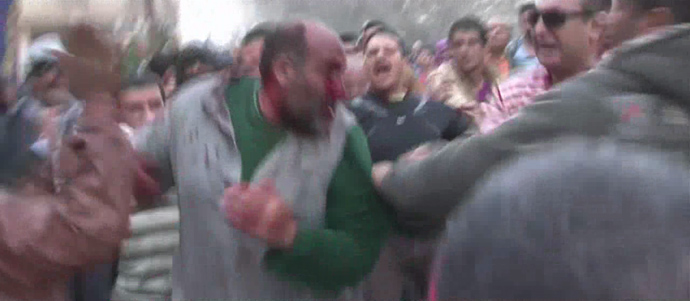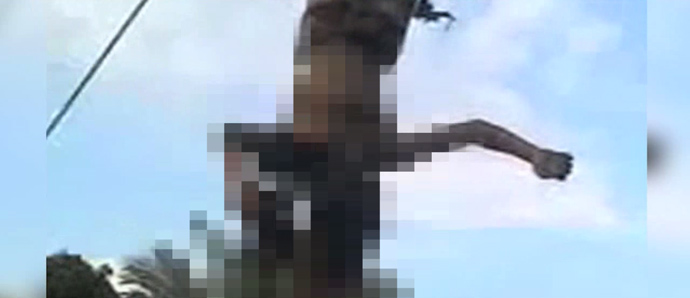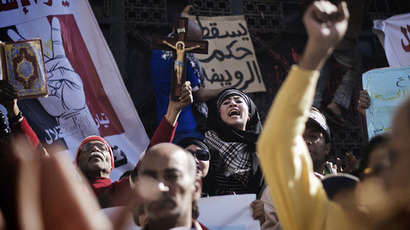Lynch mobs rise in post-revolution Egypt as people demand justice
Egypt’s political and economic instability has given rise to a growth in vigilante killings, with the lynching of suspected criminals becoming increasingly common in some rural areas.
Am Sabri’s son Mustafa,a 31 year old man from the Nile Delta, is one such recent victim of a public lynching, brutally murdered by an angry mob that allegedly took him for a thief, and hung him for display in broad daylight.
“The crowd thought he was a thief because he was mentally ill. The first blow came from behind on the back of his head, then part of his skull was hacked off. The second hit was to his chest – they cut him open,” the victim’s father told RT.
Unfortunately, Mustafa’s case is not unique. These brutal vigilante executions have been on the rise, with at least 17 cases reported only in the province of Sharqiya alone, since 2011’s revolution.

The most high profile killing in Sharqiya has been the son of a leading member of the Muslim Brotherhood political party, 16-year-old secondary school student Yussef Rabie Abdessalam, killed earlier in May. He was lynched by Qattawiya villagers for shooting a man that criticized the Brotherhood on the internet.
Online videos of the ‘rural justice’ show a pattern - an angry crowd viciously drags a man through the street, sets his corpse on fire and strings it up on a tree for public display, while the security forces remain absent from the scene.
Officials from the ruling Freedom and Justice party and the police admit that the authorities are reluctant to confront suspected mob killers, RT’s correspondent Bel Trew reports.
Egyptian Justice Minister Ahmed Mekki has condemned such killings in the media, saying that it “signifies the death of the state” as cited by Al Arabiya.

However, law enforcement officials have been accused of failing to control the situation, particularly when entire villages with thousands of people are involved in these vigilante mobs.
"When a whole village kills a man, do you think it is possible to arrest all 10 to 15,000 residents? Of course not," captain of the regional Belbies Police Station, Mohamed Farag, is quoted by local newspaper Ahram Online as saying.
These words are no consolation to the victim’s families who fear that the violence and injustice will continue.
“The local security chief said ‘give me one name and I will arrest him in 24 hours’. Now Mustafa has been dead for 50 days. And the security director has done nothing” said Sabri, the victim’s father.
Though such examples of mob justice are only arising in rural areas, many fear that the killings may spread to major cities.
The lynch mobs show the government’s failure to provide justice, rights advocate Karim Ennarah told RT.
“These increasing cases of lynches and communal violence, people taking justice into their own hands there are a visible sign of increasing lack of faith in the society, faith into the criminal justice system.”
The excessive use of force by police during protests and demonstrations has contributed to the negative attitudes now taken to the rule of law, both under the interim rule of the Supreme Council of the Armed Forces (SCAF) and the current Muslim Brotherhood President Mohamed Morsi.

“People in Egypt have always had a negative relationship with the police, and not a very good relationship with the judiciary. But that has become even worse after the revolution,” acknowledged Ennarah.
However, local leader of the Freedom and Justice party Ahmed Shehata, who personally knew one of the victims, says that the security situation is improving in post revolution Egypt.
“Egypt has experienced one of the best revolutions in history. The country is being healed very quickly. We are almost in a stable situation, there will be security. We have a plan for the economy and security of Egypt,” Shehata told RT.
Since the 2011 uprising that overthrew President Hosni Mubarak, the Muslim Brotherhood has established itself as the country’s ruling party, but has failed to make any reforms, Egyptian blogger and journalist Wael Eskandar told RT . He added that the government gives resources only to the elite to solidify the party’s power, but not to those who need help.
“The great danger is that no reforms are done…We have a horrible social security network. If you don’t want political unrest you have to feed people, you have to give them shelter, you have to solve their problems. This has not been the case with Muslim Brotherhood, they are just solidifying their rule, they are not sharing power with anyone.”














